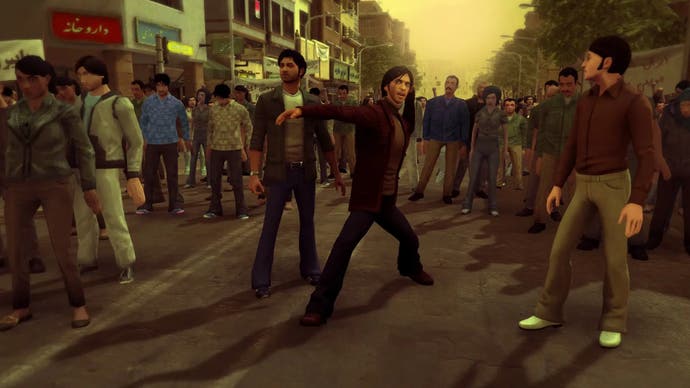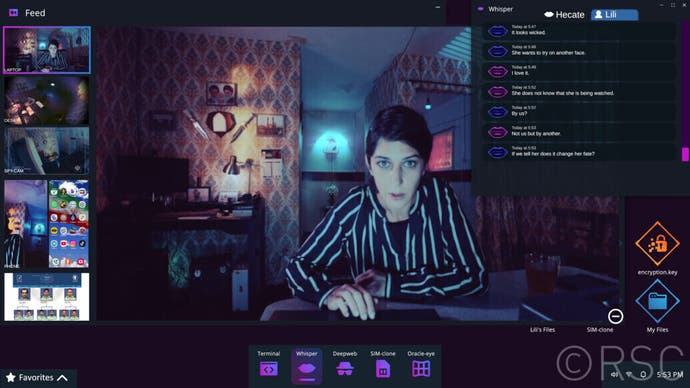The Royal Shakespeare Company is working on its first-ever video game, an adaptation of Macbeth – but it doesn’t play out as you’d expect.
The game, a collaboration with developer iNK Stories,is called Lili and is set in contemporary Iran. Here, the title character is inspired by Lady Macbeth and played by Cannes Best Actress winner Zar Amir.
As such, iNK Stories is describing the game as a neo-noir “screen-life thriller”, combining live-action and interactive storytelling, and is influenced by Amir’s experiences as an Iranian woman in exile battling authoritarian gendered oppression.
“We’re really calling this genre a ‘screen-life thriller’, with the idea that all of this is transpiring on your desktop,” iNK Stories co-founder Navid Khonsari tells Eurogamer. “The real focus for that is we want to embrace a large audience, people that naturally might not see themselves as wanting to play games.”
Khonsari previously worked at GTA developer Rockstar as cinematic director on GTA 3, Vice City and San Andreas, as well as the Max Payne games. After leaving the company he co-founded iNK Stories with his wife Vassiliki Khonsari and together they gained notoriety for their previous BAFTA-nominated game 1979 Revolution: Black Friday set in the Iranian Revolution.
Now they’re working with the RSC on Lili, which was a suggestion from the company’s director of digital Sarah Ellis, who was familiar with iNK Stories’ work. “For us it became pretty clear that it would be abundantly thrilling to turn Macbeth, this timeless tale, into a game,” Vassiliki says.
“Obviously all of Shakespeare’s stories have transcended both time and culture, being adapted in multiple different ways… but not in this form,” adds Navid. “For us, the challenge of it and the adaptation of it and making something interactive, putting the audience at the centre of this incredible story that has so many climactic moments and allow you to be in the middle of that rather than being somebody that’s just observing it, was not just a great challenge, but also what a great story!
“It’s made for that kind of player who likes to explore and really live in that world,” he continues. “As we know, Shakespearean text is so rich: the backstories, the history, the evolution of each character. It was such rich material to be able to draw from.”

The studio worked with dramaturges to bring Shakespeare’s play to life in a new setting, with help in particular from RSC board member and leading Shakespeare academic Emma Smith. It’s been a collaborative effort, with Navid describing a “continual conversation and collaboration” with the RSC to be able to push the boundaries of the play.
So how exactly will Lili play? Players will take the role of a hacker, initially tasked with befriending Lili, but to do so means infiltrating her hardware, using the dark web and government surveillance to follow and watch her. This takes place through live-action sequences to maintain the theatricality of the original play. Later, players will use these same tools to take down the regime that’s oppressed Lili, though the pair noted the game’s moral ambiguity – while it loosely follows the events of Macbeth, players can still impact the narrative.
Macbeth has a legacy of being an “enigmatic character”, says Vassiliki, with Lady Macbeth as “both a heroine and a villainess and wildly complicated”. She continues: “Through the lens of 400 years, who is this woman with this thirst and ambition? How do we unpack her today?”
As such, Macbeth provided an “interesting entry point to touch on today’s culture points” and a “perfect moment” of combining Shakespeare’s play with modern day Iran. “There was a lot of electricity when we started thinking about bringing Macbeth to Iran and what are the parallels in the morality police in which we’re placing this military hierarchy of Macbeth and Lady Macbeth and adapting that too,” says Vassiliki.
“There was a lot of electricity when we started thinking about bringing Macbeth to Iran.”
“When we first started looking at the story and initially digging in, there’s something extremely strong and attractive about [Lady Macbeth] but we realised because of her gender, she was limited,” says Navid. “The question of gender is something that’s becoming globally challenging right now, not just within Iran. So we wanted to not just scratch that, but to then recognise this is obviously the huge thing that’s impacting women, specifically in Iran.”
Macbeth’s infamous witches also became an entry point for the game’s parallels with the play. While the team had begun development before 2022’s protests that followed the death of Mahsa Amini – a woman who died due to injuries sustained while in police custody – these circumstances added to the game’s pertinence. “All of a sudden the country was going into this technological lockdown and the flow of information was being governed by the regime and at the same time there were hackers and people at the forefront of trying to allow information to leave Iran, but also allow people to organise within,” explains Vassiliki. “That, for us, became this really beautiful parallel of the witches and Macbeth. They control the flow of information and within our world they’re the forecasters of chaos. They’re agents of destabilisation. They’re both supernatural and sort of digital in their omnipresence.”

Through making the game, the pair say they have considered the intersection between theatre and games. “Theatre, as it unfolds in a live setting, there is an interplay between the audience and the performance,” says Vassiliki. “Particularly during Shakespearean times… that open forum of back and forth took place. And that’s actually like games in that it’s all happening and unfolding in a live way whereby the player has agency, the audience has agency within that world – unlike film. What was really fascinating was working with the dramaturges, working with the Shakespearean experts, and really mining for the places where there is immersion and there is room for interpretation.”
Ultimately, all this means Lili will be quite different to what is generally expected from Macbeth, but Navid noted the core of the story remains underneath. “We make games for global audiences and sometimes if we become too literal to the text, we feel like we’d actually be pushing our audience away,” he says. “We wanted to draw them in by staying true to the material, by the themes of the material, but also make it digestible in a way and global in a way that language doesn’t become a barrier for people wanting to play the game.”
Adds Vassiliki: “It’s very important to us to preserve the thematic strength of these stories. They’ve endured for so long for a reason. How do we make sure we’re honouring that? That’s been part of the relationship with the RSC in not just going hogwild with off-the-wall interpretations, but actually allowing these interpretations to further enrich the original text.”
“Forget the old chestnut that Shakespeare would be writing for Hollywood if he were alive now: what Lili makes absolutely clear is – he’d be writing for gaming.”
Really, Lili is proving the timelessness and universality of Shakespeare’s plays. As Emma Smith said, as quoted in a press release for the game: “Forget the old chestnut that Shakespeare would be writing for Hollywood if he were alive now: what Lili makes absolutely clear is – he’d be writing for gaming.”
Vassiliki extends this idea. “The linearity of traditional films don’t capture the richness of the worlds [Shakespeare] created and the characters,” she said. “I think games absolutely can do that, the fact they’re non-linear and you can provide this canvas that allows for exploration and interaction and agency, it’s so much more complicated and complex.”
She adds: “Games are the contemporary zeitgeist of today’s culture… you can see that we gravitate towards this medium because it affords us agency, it affords us a place where we can fully invest in a world and make choices as ourselves and see the consequences of how that unfolds.”
Lili is still in development and is due for release later this year. It follows the release of Grand Theft Hamlet, a documentary film about staging Shakespeare inside GTA Online.
Perhaps, then, this could be the start of a Shakespearean renaissance in video games.





